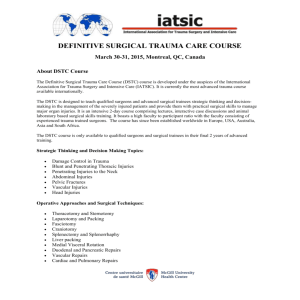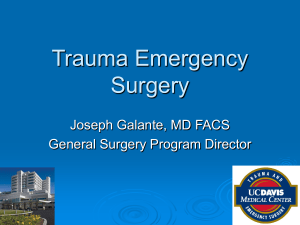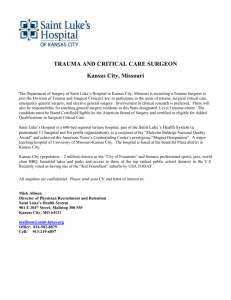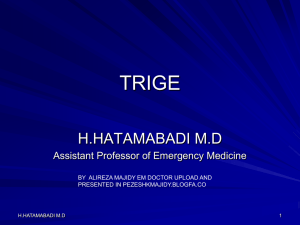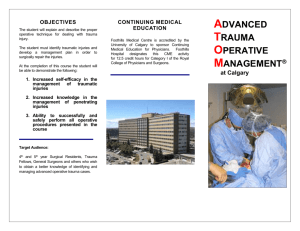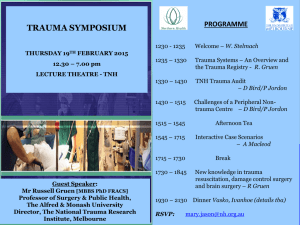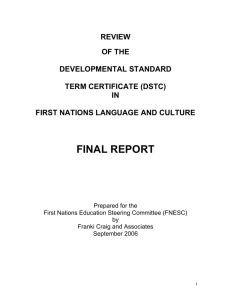Canadian - The Canadian Association of General Surgeons
advertisement
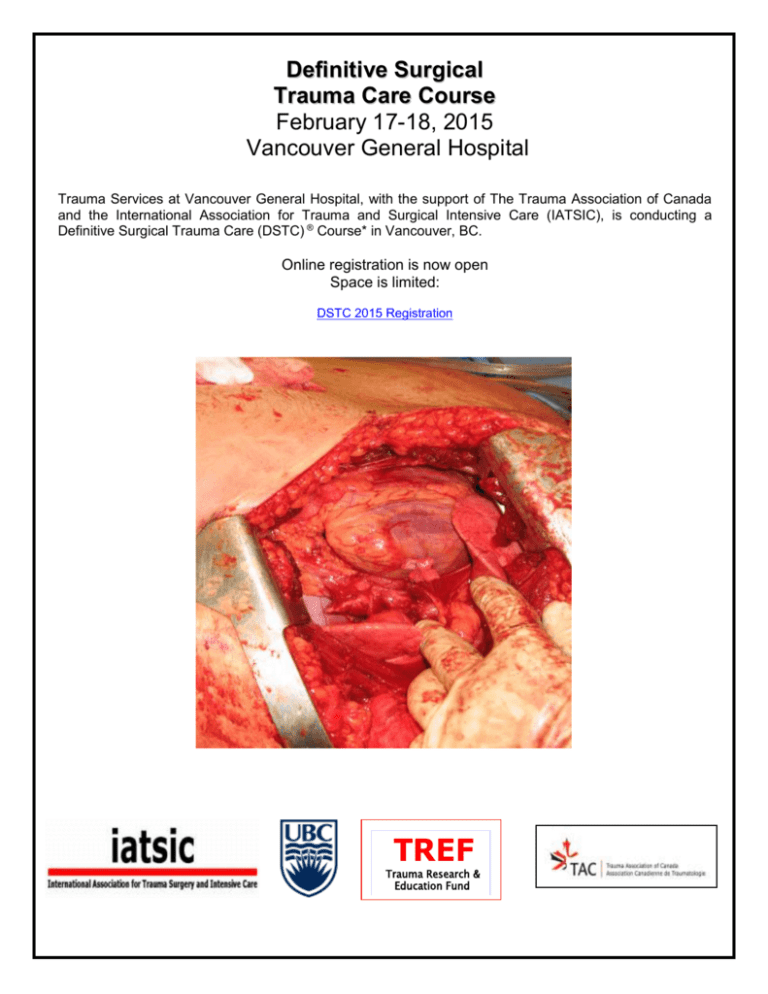
Definitive Surgical Trauma Care Course February 17-18, 2015 Vancouver General Hospital Trauma Services at Vancouver General Hospital, with the support of The Trauma Association of Canada and the International Association for Trauma and Surgical Intensive Care (IATSIC), is conducting a Definitive Surgical Trauma Care (DSTC) ® Course* in Vancouver, BC. Online registration is now open Space is limited: DSTC 2015 Registration TREF Trauma Research & Education Fund Vancouver General Hospital 855 12th Avenue West Vancouver, BC V5Z 1M9 fax: (604) 875-5348 TREF Trauma Research & Education Fund Definitive Surgical Trauma Care Course®- February 17-18, 2015 We are offering a unique educational opportunity in advanced Trauma Surgery. The DSTC Course is exclusively for Surgeons and it will be held on February 17-18, 2015. IATSIC is part of the International Society of Surgery and, since 1991, has become an international forum for trauma surgery. The course was developed for qualified surgeons with trauma as an integral (although possibly infrequent) part of their practice and designed to assist in their decision-making and operative approach relating to serious trauma. DSTC is a response to the lack of written material and teaching on strategic issues of resuscitation, early definitive care, and surgical priorities. It assumes all of the ATLS® principles and builds on them. The Vancouver DSTC course is sponsored by the Trauma Research and Education Fund (Vancouver) with industry support. Participation is limited to a maximum of 20 registrants only. Course Venue: Vancouver General Hospital Course Dates: February 17-18, 2015 Course Fee: $1500.00 CAD Accommodation: Holiday Inn – Vancouver Centre 711 West Broadway, Vancouver, BC, V5Z 3Y2 604-707-1939 / 1-877-660-8550 (request VGH – DSTC group rate) www.hivancouver.com (use group code – VGH) Deluxe room - $115 This is a rare opportunity for a small group of Surgeons to work intensively over 2 days with highly experienced teaching faculty. I do hope you can join us. Sincerely, Richard K. Simons, MB, BChir, FRCSC, FACS, FRCS DSTC Course Co-Director Naisan Garraway, LCol, CD, MD, FRCSC DSTC Course Co-Director Nasira Lakha, RN, BScN, MHS Trauma Program Manager, VGH Course Coordinator ~ This program is recognized by the Royal College of Physicians and Surgeons of Canada (RCPSC) as a Traineeship under MOC Section 2 Self-Learning TREF Trauma Research & Education Fund DEFINITIVE SURGICAL TRAUMA CARE (DSTC) COURSE DESCRIPTION BACKGROUND Injury (trauma) remains a major health care problem throughout the world. In addition to improving prevention and resuscitation, improved application of surgical skills is expected to save further lives and contribute to minimizing disability. It is widely recognized that training of surgeons in the management of trauma is substantially deficient because of: (a) Limited exposure within individual training programs to the types of patients required to develop the appropriate level of skills and (b) Traditional trauma surgery training, which has been organ specific but not well grounded in the management of multiply injured patients with competing priorities. Consequently surgeons can finish training with sub-optimal skills in this field where there is often little time to contemplate an appropriate course of action. Through the early 90's, it became apparent to a number of surgeons familiar with trauma management around the world, that there was a specific need for surgical training in decision making and the technical aspects of operative care of the trauma patient, placing particular emphasis on those who were close to, or had recently completed their training. DSTC had its origins in a meeting between Howard Champion (USA), David Mulder (Canada), Donald Trunkey (USA), Stephen Deane (Australia) and Abe Fingerhut (France) in October 1993. This postgraduate surgical course for 20 participants assumes competence with assessment and resuscitative measures, which have become standardized in North America through The American College of Surgeons ATLS® Course. It draws on the specialist surgical training of all course participants and reviews, strengthens and organizes the performance of established and new procedures specially required in trauma surgery. Courses have been conducted in Europe, USA, Asia and Australia. It is expected that this standardized course will have special relevance for surgeons in countries like Canada and Australia, where major trauma rates are relatively low and to rapidly mobilized medical units in areas of conflict. It is also likely to be valuable in developing countries where education and physical resources are limited. DSTC has developed in many continents under the umbrella of IATSIC, International Association for Trauma Surgery and Intensive Care. This eighth Canadian DSTC Course is being promoted by the Trauma Association of Canada and Trauma Services, Vancouver General Hospital. Increasingly it is being recognized that DSTC is an outstanding educational event meeting the very real needs of surgeons caring for the injured. COURSE STRUCTURE A mixture of manual and lecture based learning, case discussion and surgical skills demonstration and practice. Manual addressing “Physiology and Organ Support”, decision making in trauma surgery and surgical techniques Two theory sessions addressing technical surgical strategies Two sessions addressing strategic thinking in Trauma Surgery Two practical session addressing technical surgical strategies One session on troubleshooting COURSE MATERIALS The course will run for two days with the following course materials: A manual to supplement the course content Standardized Slides Practical and technical skill stations Patient scenarios in acute trauma surgery Practical work laboratory using animals and cadavers Participant members are limited to 20 in DSTC courses with a high faculty to participant ratio, allowing for two faculty members to four participants in hands-on practical skill sessions SURGICAL PROCEDURES This session will provide hands-on exposure to operative techniques in a small group with a high faculty/participant ratio. For general information and inquiries about DSTC contact: Sylvia Donnelly, DSTC Course Secretariat email: sylvia.donnelly@vch.ca
